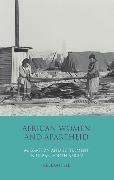Read more
Informationen zum Autor Rebekah Lee is Lecturer in the Department of History, Goldsmiths College, University of London. She has published on the social and cultural history of South Africa, and her research interests include gender and migration, religion, identity, health and material culture. She is currently engaged in a collaborative project on the history of death in Africa from c. 1800 to the present day. Klappentext Explores the process and consequences of settlement through the everyday lives and testimonies of three generations of African women in Cape Town during the apartheid (1948-94) and post-apartheid periods. Vorwort Explores the process and consequences of settlement through the everyday lives and testimonies of three generations of African women in Cape Town during the apartheid (1948-94) and post-apartheid periods. Zusammenfassung In this compelling study, Rebekah Lee explores the process and consequences of settlement through the everyday lives and testimonies of three generations of African women in Cape Town during the apartheid (1948-94) and post-apartheid periods. How did African women experience apartheid? How did they create a sense of belonging in a city that actively denied and resisted their presence? Through detailed analyses of women's management of domestic economies, their participation in township social organizations, their home renovation priorities and patterns of energy use, this study evokes a larger history of gendered and generational struggles over identity, place and belonging. It provides a deeper and more nuanced understanding of African women in apartheid and post-apartheid society, and of urbanization in South Africa. Drawing together scholarship and new methodologies from anthropology, history, human geography and development studies, "African Women and Apartheid" will be valuable to anyone with interests in South Africa, gender, urbanization, the African family, oral history and memory. Inhaltsverzeichnis TABLE OF CONTENTSIntroduction: Location, Method, MeaningChapter One: Mapping Cape Town’s Historical and Political Geography, 1948-2000Chapter Two: Structure and Agency in African HouseholdsChapter Three: Home Improvement, Self Improvement: Renovations and the Reconstruction of ‘Home’Chapter Four: Hearth and Home: Energy Resourcing and Consumption in an Urban EnvironmentChapter Five: Beloved Unions?: Associational Life in TownChapter Six: ‘Moving’ Memories, Urbanising Identities...

